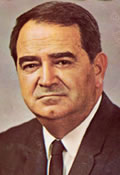 This Goodly Land
This Goodly Land
Forrest Carter (September 4, 1925–June 7, 1979)

Other Names Used
- Asa Earl Carter: birth name
- Ace Carter: nickname
- Bedford Forrest Carter: pen name
Alabama Connections
- Oxford, Calhoun County: birthplace, childhood residence
- Birmingham, Jefferson County: adult residence
- Anniston, Calhoun County: adult residence, place of burial
- Montgomery, Montgomery County: adult residence
Selected Works
- Carter, Forrest. The Rebel Outlaw, Josey Wales. Gantt, Ala.: Whippoorwill Publishers, 1973. Rpt. as Gone to Texas. New York: Delacorte Press, 1975. Rpt. as The Outlaw Josey Wales. New York: Dell, 1976.
- Carter, Forrest. The Education of Little Tree. New York: Delacorte Press/E. Friede, 1976. Rpt. Albuquerque: University of New Mexico Press, 1986.
- Carter, Forrest. The Vengeance Trail of Josey Wales. New York: Delacorte Press/Eleanore Friede, 1976.
- Carter, Forrest. Watch for Me on the Mountain. New York: Delacorte Press, 1978. Rpt. as Cry Geronimo. New York: Dell, 1980.
Literary Awards
- American Booksellers Book of the Year (ABBY) Award, American Booksellers Association, 1991, for The Education of Little Tree
Biographical Information
Forrest Carter was born Asa Earl Carter. He grew up on his family’s farm near Oxford, Ala., just south of Anniston. After high school, Carter enlisted in the US Navy and was trained at the University of Colorado to be a radioman, serving in the Pacific Theater of World War II. After his discharge, Carter worked as a radio announcer in Denver until 1952, when he returned to Alabama. He worked in Birmingham as the radio spokesman for the American States Rights Association, until he was fired for offending local Jewish leaders during National Brotherhood Week. With a friend, Carter published a segregationist magazine, The Southerner. He also started a local chapter of the Ku Klux Klan whose members conducted the kidnapping, beating, and castration of Edward Aaron in 1957. In 1962, Carter began working as a speechwriter for George C. Wallace during his first run for governor. Wallace’s 1963 inaugural speech, best remembered for the line “Segregation now, segregation tomorrow, segregation forever,” was written by Carter. By 1970, however, Carter was impatient with Wallace’s “liberal” views and ran for governor himself, finishing last. In 1972, he sold his farm and disappeared from public life.
Carter reappeared in 1973, calling himself Bedford Forrest Carter and claiming to be a half-Cherokee cowboy who had been born in Tennessee. His book, The Rebel Outlaw, Josey Wales, was published privately in 1973 and republished by Delacorte as Gone to Texas later that same year. The actor Clint Eastwood directed and starred in the movie version, The Outlaw Josey Wales, which was released in 1976. A mid-1970s television interview led some Alabamians to connect Forrest Carter the novelist with Asa Earl Carter the politician, a connection Carter himself denied. In 1976, Carter published two more novels, The Education of Little Tree (which he claimed was autobiographical) and a Josey Wales sequel. Both were filmed after Carter’s death. The former was released in 1997, while the latter was released in 1986 as The Return of Josey Wales. His last novel was a Western about the Apache leader Geronimo. Carter died in Abilene, Texas, while visiting one of his sons.
Interests and Themes
Forrest Carter wrote three novels about the American West and one novel about an Appalachian child learning Cherokee folk wisdom from his grandparents. The latter book, The Education of Little Tree, was published as autobiography but was later shown to be fiction.
For More Information
Please check your local library for these materials. If items are not available locally, your librarian can help you borrow them through the InterLibrary Loan program. Your librarian can also help you find other information about this author.
There may be more information available through the databases in the Alabama Virtual Library. If you are an Alabama citizen, AVL can be used at your public library or school library media center. You can also get a username and password from your librarian to use AVL at home.
Reference Articles
- Clayton, Lawrence. "Forrest Carter/Asa Carter and Politics". Western American Literature 21.1. (1986): 19-26.
- Clayton, Lawrence. "The Theology of Survival: The Identity of Forrest/Asa Carter and Religion in His Fiction". Southwestern American Literature 19.2. (1994): 9-19.
- Gates, Henry Louis, Jr. "'Authenticity,' or the Lesson of Little Tree". The New York Times Book Review 24 Nov. 1991: 26-30.
- Greenhaw, Wayne. "Is Forrest Carter Really Asa Carter? Only Josey Wales May Know for Sure". The New York Times 26 Aug. 1976: 39.
Reference Book Chapters and Encyclopedia Entries
- Carter, Dan T. "Southern History, American Fiction: The Secret Life of Southwestern Novelist Forrest Carter"; Rewriting the South: History and Fiction. Ed. Lothar Honnighausen and Valeria Gennaro Lerda. Tubingen, Ger.: A. Francke Verlag, . 286-304.
- Roche, Jeff. "Asa/Forrest Carter and Regional/Political Identity"; The Southern Albatross: Race and Ethnicity in the American South. Ed. Philip D. Dillard and Randal L. Hall. Macon, Ga.: Mercer University Press, . 235-274.
Reference Web Sites
- Barra, Allen. "The Education of Little Fraud". Salon.com. 2001. Salon. http://archive.salon.com/books/feature/2001/12/20/carter/print.html.
- Bollman, Amy Kallio. "The Education of Little Tree and Forrest Carter". NativeWeb. 2001. NativeWeb, Inc. http://www.nativeweb.org/pages/legal/carter.html.
- Browder, Laura. "If This Is Tuesday, It Must Be Montgomery: Adventures in Documentary Film Making". Blackbird: An Online Journal of Literature and the Arts. 2007. Virginia Commonwealth University Department of English and New Virginia Review, Inc. http://www.blackbird.vcu.edu/v6n1/nonfiction/browder_l/intro.htm.
- Clayton, Lawrence. "Carter, Asa Earl". Handbook of Texas Online. 2004. The General Libraries of the University of Texas at Austin and the Texas State Historical Association. http://www.tshaonline.org/handbook/online/articles/CC/fcaak.html.
- Morgan, Gillis. "Asa Carter (Forrest Carter)". The Encyclopedia of Alabama. 2009. Alabama Humanities Foundation and Auburn University. http://www.encyclopediaofalabama.org/face/Article.jsp?id=h-2427.
Photo courtesy of the Birmingham Public Library Archives, Asa Earl Carter Publications, File No. 1265.1.2.
Last updated on May 30, 2008.